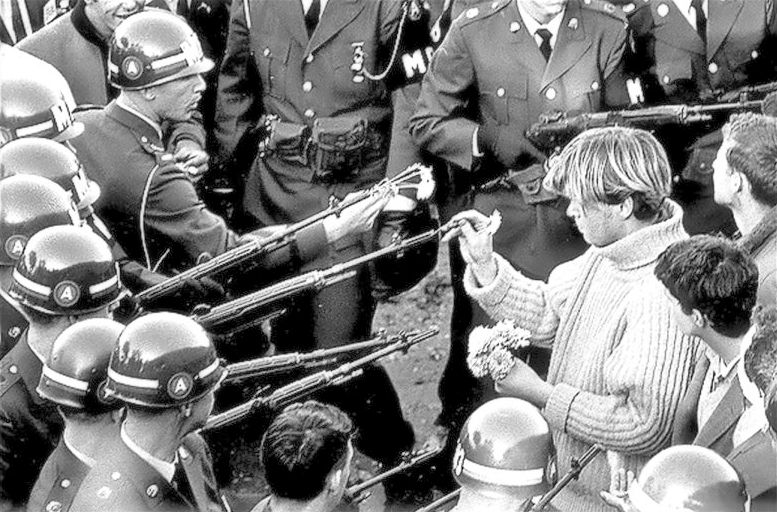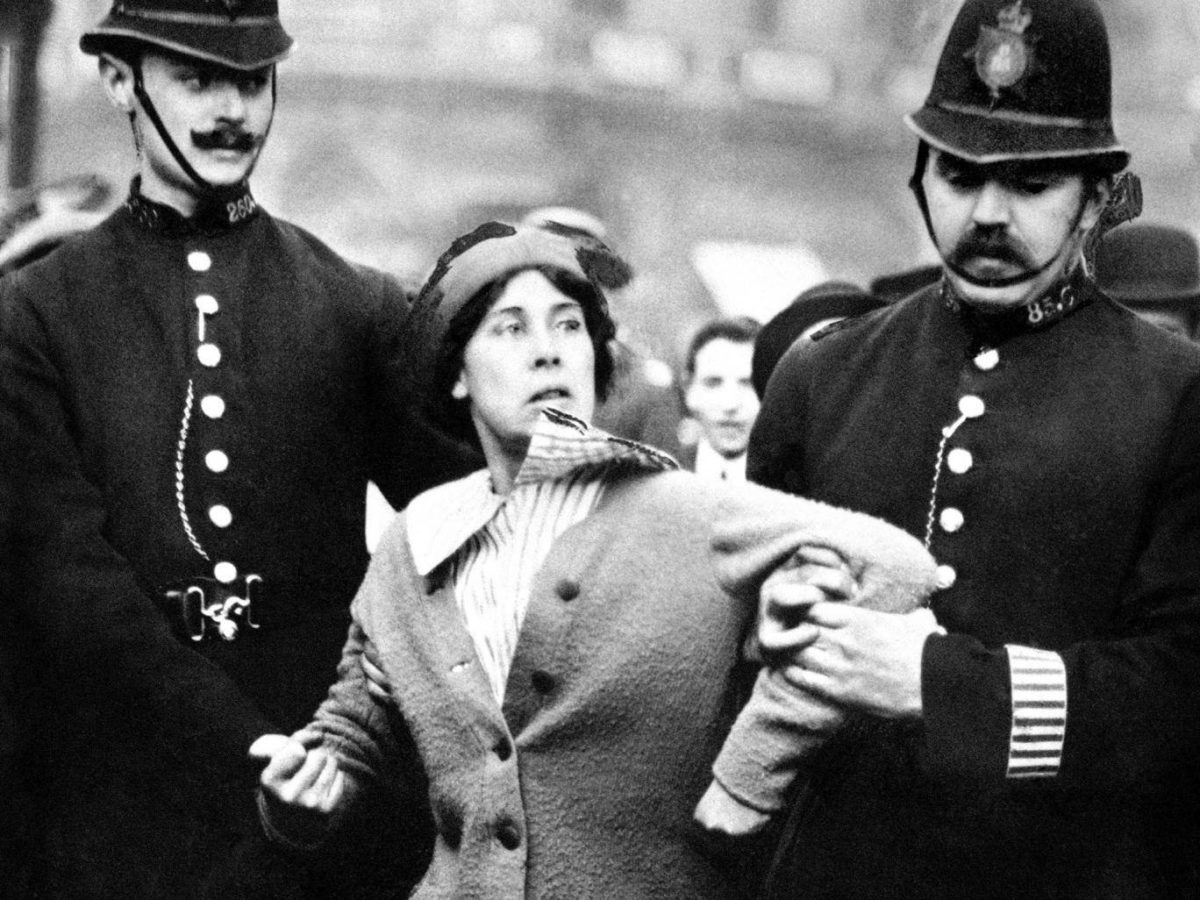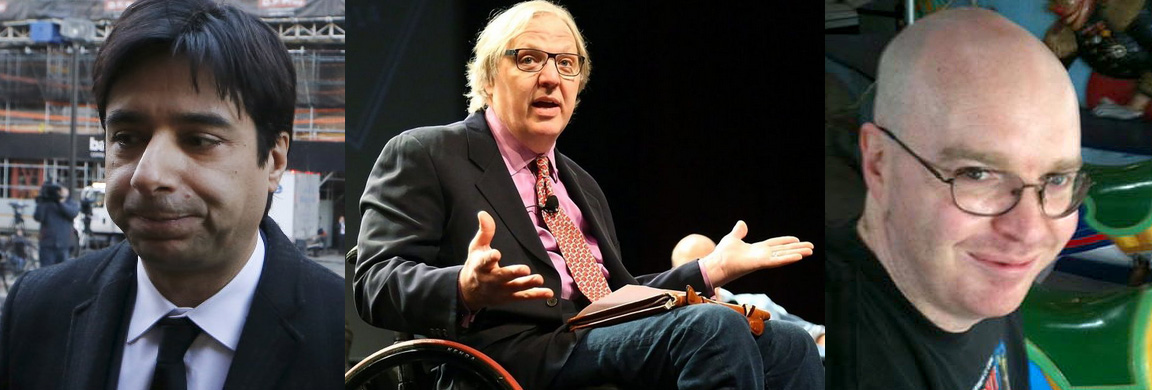Whenever I need to identify some quality inside myself, I ask multiple people about it until one person confirms the truth.
Here’s a benign example: Over the last two years, I regularly attended a karaoke bar, coming in each week and singing anywhere from six to a dozen tunes. People kept complimenting me on my singing. I was showered with free shots and often given four song slips for every drink rather than one. (I received a similar reaction by a hilarious KJ in Brooklyn who refers to me as “my man E” during his hip-hop karaoke nights.) I didn’t believe it. I thought they were just being nice. It was only after about one hundred people offered me fulsome praise that I started to think, “Well, maybe there’s something to this.” And that’s when I bought a guitar last August, picking up the instrument after ten years of not owning one, and I started writing a few dozen songs. I put up rough versions of these ditties onto Instagram and people really liked them.
A far less pleasant example of this happened over the last week. My audio drama, The Gray Area, won a Parsec Award. This was an incredible honor. I worked hard for years to make something positive and beautiful and meaningful. I designed the series to run over the course of four seasons and, to the best of my ability, explore moral questions that argued for kindness and empathy and compassion towards other people.
But someone led a campaign that accused me of being a sex offender (false, he found another man who shared my name, but not my middle name) and of committing “extremely disturbing behavior” (a charge that I was genuinely baffled by, unless it referred to a 2014 incident involving a nervous breakdown and a suicide attempt, in which I have already fully acknowledged my wrongdoing and debunked many false claims, issued many apologies for, and done my best to atone for). Dozens of people aware of the 2014 incident wrote in my defense. The Parsec Committee looked into it. They upheld the award.
This ruling greatly upset the audio drama community. I was then accused of “victimization” and “threats” and “harassment.” Even though I have never possessed any intention of threatening or harassing or victimizing anyone and the messages in question involved the expression of hurt feelings, and even though many people got the details and even the tone and language of these messages incredibly wrong, the upshot is that the community decided that I was an irredeemable creep.
But as I said, whenever I need to identify some quality inside myself, I ask multiple people about it until one person confirms the truth.
So I sent copies of the messages to numerous people. I own up to every mistake I have ever made in my life. While everybody else stated that I was not in the wrong, one good friend who always tells me the truth said that there was “some ugly stuff.” And upon further reflection, I have to agree with him. I have a problem.
I can tell you for a fact that I texted “You are pure evil” to a producer who I had busted my hump for, but who nevertheless blocked me and dropped me from a role (effectively “erasing” me in the manner of Kevin Spacey, thus comparing me with a serial sex offender when I have never committed or even contemplated an act of sexual misconduct in my life) and condemned me without notice while I was completely drunk and feeling suicidal over what people were claiming about me on the evening of Tuesday, December 18th (and I barely even remember sending the text, much less the Lyft ride home (the email receipt was a surprise to me), but I do recall the good friend who was incredibly kind to talk with me at a very late hour to make sure that I was okay). Is that context even important? Probably not. The action is execrable.
I hereby apologize with total candor and full humility to that producer for four words that decimated everything. I am ashamed of what I texted and ask for forgiveness.
Now here’s the part where the situation gets thorny.
Okay, so I couldn’t help but notice that you favorite every #ADS mention of your show except mine. You (and others) seem to be practicing the Wittgenstein line about remaining silent “about what one can not speak.” I get it. And hey, that’s totally your prerogative! Just so you know, I’m not really interested in being negative. We follow each other. Who knows? Maybe we even listen to each other. (I’m currently current on [NAME OF SHOW REDACTED].) The way I see it, we have two choices. We either carry on in this shaky and uncertain manner, possibly feeling bits of doubt or meh or ugh about each other (which I really don’t want to do), or we get to know each other, finding hope, humanism, and possibility, asking each other questions and clearing things up, operating on a more positive footing. Personally I much prefer situations in which people get along, are naturally themselves, do their own thing, forge fun collaborations, and learn from each other. It is vastly superior and far more fruitful than circumstances in which people are needlessly suspicious, skeptical, scheming, seeing the worst in each other, et al. And I’d like to think that – and this may be overly idealistic of me, but I’m nothing if not inexorably sanguine at times – the AD world is noble and big and resilient enough to work past any and all differences and disputes.
Here’s the deal. I’m probably going to be making AD for the next few years. I’m sitting on four years of scripts I plan to produce. So I’m putting it out there. What do you say to a detente? For what it is worth, what I articulate here is more or less my position with anyone in the AD world. Everyone has a past. What counts and what is ultimately more important is the present. I know there has some debate about me that never involves me. Some of the deets spill my way. And this makes no sense to me. Aren’t we adults? Wouldn’t it make sense to go straight to the source and work something out? Aren’t dialogues and mutual listening the hallmark of ALL arts and humanities? Why cast aspersions on someone without at least ATTEMPTING a good faith conversation? So I’m putting it out there. The door is open. The ball is in your (or anyone else’s) court. Thanks and peace, Ed
(BTW, I truly enjoyed the [SUBJECT REDACTED] thing from a few months back.)
This was the only private message I ever sent (through Twitter DM) to a pair of audio drama producers. When I did not hear back, I simply unfollowed them. I did not follow up, harass, or communicate with them further in any way after this message. I have reviewed my records very carefully. Yet these two producers have claimed that I harassed them. They claimed, among other falsehoods, that they had “received private messages from this individual on a wide variety of social media accounts…[that] grew increasingly angry, accusatory, and carried a feeling of instability,” when the ONLY private message I sent was the one above and the tone is not angry or accusatory at all.
It is certainly within anyone’s prerogative to not wish to communicate with me and I completely and totally honor that, but it is not any person’s right to invent false allegations that other people take seriously –- especially when I have not been informed in any way of how I was coming across or what part of the benignly intended message constitutes “harassment.”
Another figure in the audio drama world claimed I was “victimizing” her, but a review of a March 29, 2018 Twitter thread in which this figure and I participated revealed no victimization whatsoever and, in actuality, a cordial consideration of her viewpoint. She “came forward” and I’m sorry she feels this way, but she didn’t produce any tangible evidence of wrongdoing on my part that I am aware of. And people believed her, including the host of an audio drama showcase podcast and a noted playwright who also writes for the ear, even though I have never spoken with her or met her and our communications were exclusively written and thus unquestionably upheld by concrete evidence that was neither produced to me nor given the specific “victimizing” context.
Some producers claim to have “seen screenshots,” but these have never been revealed to the public. My polite requests to see these screenshots for myself — (a) to corroborate that I said what they believe I said and (b) to determine how people could form these takeaways and address any perceived transgressions with atonement and contrition — have been repeatedly refused. I don’t even know if these screenshots actually exist. As I told one producer who, upon hearing all these stories, asked me to stop my Patreon contribution (I swiftly honored his request), “By your standards, we should imprison any random person walking within three blocks of a crime scene for murder.”
I have never attended a podcast conference in my life (only a barbeque party involving several audio drama producers in which I drove up with three homemade salads and in which I cheerfully cooked breakfast for everybody the next morning and a live performance at a Pittsburgh crime convention that I drove 100 mph on the Pennsylvania Turnpike to make on time after getting tied up in traffic), yet I have been accused of “threats of physical violence at podcast conferences [plural], stalking and intimidation of creators AND their families,” and so forth. This simply did not happen. The only thing I can think of that comes anywhere close to anything along these lines was when, at the barbeque, another producer and I staged a mock argument for the camera and I was photographed waving my hands as the other producer reacted with theatrical shock as many people surrounding us were clearly laughing. Did someone interpret this fabricated photo as me threatening other people? I don’t know. But this did not happen.
I am happy to issue any apology and ask for forgiveness to anyone who has ever felt wronged by me. But I cannot do so when the events or the actions haven’t happened. Is that so unreasonable?
Moreover, because I have done something terrible in the past, which again I have fully acknowledged and atoned for, I am held to an impossible existential standard where any mistake I make in the present deserves neither pardon nor understanding. And, hey, I’m going to make mistakes. There isn’t a single human being on this planet who is perfect. But I’m telling you that all I can do is try to be the best man I can.
This is not a case where I am Kevin Hart, who upon accepting the Oscar hosting gig, whipped up a justifiable frenzy for arrogantly refusing to apologize for his homophobic tweets in the past. I have apologized for my past and I will apologize again and again and again to anyone who needs to hear it. As long as it takes. What I did in 2014 was disgraceful. I am trying my best to curb any remotely similar tendency.
Here is what I have done to address the present state of affairs:
I have formally written to the Parsec Committee to reject my award for the greater good. I have deactivated the social media accounts that continue to land me in trouble and am unlikely to return.
Additionally, since the trouble I get into usually arises from feeling and expressing deep hurt, beginning today, I will refuse to correspond with anyone who demeans or debases me in any way. This need to defend myself and respond with everything I’m feeling in my heart, which works a lot better when it’s put into a story or an essay, has scared the bejesus out of people when it’s personally directed – so much so that months and even years of unimpeachable good will and kindness are erased by a mere sentence. My feelings don’t matter. That has been made clear enough. But as of now, if you’re corresponding with me and you haven’t heard from me for some reason, I’m not taking the bait. You’re going to have to be the one to follow up and figure it out. I’m tired of letting the hurt that others casually eke out to me, all this while feigning innocence, and my stupid responses to it overwhelm the considerable good that I do and I cannot have my relationships with others become grossly distorted and tarnished due to this unflappable tendency to respond to everything. I accept that some people are mean and some people will always despise me. There is nothing I can do about this, except choose not to react. It’s a waste of time and energy trying to get through to people who have already made up their minds. If they want to feel that way, it’s perfectly within their rights. This is something I should have started doing years ago. Because I never would have landed into so much trouble. But, hey, better late than never.
The fate of my life and the second season of The Gray Area, which I spent more than a good year working on and for which I had recorded about 70% of the dialogue for, is now incredibly uncertain. I would very much love to complete the second season. Because it’s been a bountiful joy to work on. The actors I work with are incredibly kind and talented and I treat them all as well as I can, maintaining a fun and relaxed environment committed to creative freedom and immediate compensation, and there are stories I need to tell. But this recent business has poisoned the well. And I’m going to need some time to figure out where I go from here. I don’t know how long.
Do I deserve anything? I don’t know. What I do know right now is that a number of people believe that I am deserving of hatred and humiliation and condemnation and, in one case, even death, and I have to listen to that while also looking out for my mental health and wellbeing.
The one thing I do want to do right now is to state unequivocally that, if you feel I have wronged you in any way and it is based on something I have actually done or said, please let me know right now and I will immediately and forthrightly apologize. You can contact me by email. If you’re not too crazy, I’ll even do it by phone.
Please let me know how I can do right. I’m asking for your help. I’m listening very carefully right now and I’m open to any guidance or suggestions.
Please understand that I am truly trying to be as honest, as fair, as open, as sensitive, and as graceful as I can here. And I also realize that there are some people out there who I will never please or satisfy. If you feel that this statement is woefully insufficient, well, I did the best I could to genuinely own up to every perceived transgression I have ever committed and I further apologize if you feel that nothing I have said here is enough. On the other hand, if you really want to believe the worst about me, then maybe you’re not my audience. So why are you here and why do you even care? You always have the choice to ignore me and live in peace.






